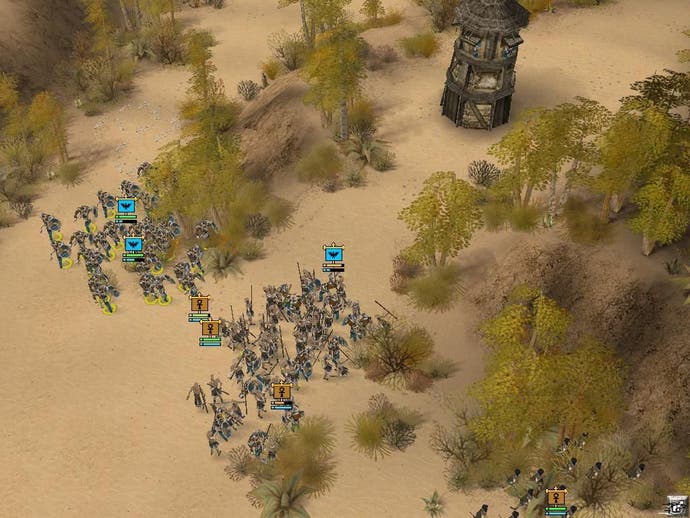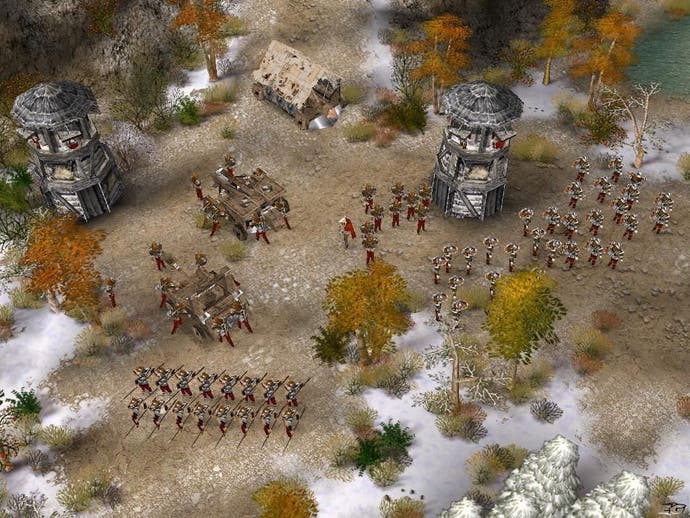Praetorians
Review - what have the Romans ever done for us, eh? Bloody Romans.
Remember watching Gladiator for the first time? Remember how the jaw-dropping opening scenes of the movie exploded onto the screen, and how your popcorn (or fattening cinema food of choice) sat abandoned as Maximus' army unleashed hell on the hapless barbarian tribes? Remember how you stood up in the cinema and embarrassed yourself by revealing your online gaming roots and screaming "0wned!" as a particularly large and bearded barbarian was felled by the Roman onslaught� No? Damn. Maybe that was just me, then.
Either way, Gladiator made the concept of marching around a bunch of men in pleated skirts with feathery helmets downright cool, but if you wanted to do exactly that in a videogame, you were bang out of luck - until now. Praetorians creator Pyro Studios, best known for the seminal Commandos games, has taken on the might of the Roman Empire in a game that spans the expansion of Pax Romana throughout Europe, North Africa and the near East.

All Roads lead to Rome
Strategy games generally fall into one of two camps; there are those which feature resource management, and those which don't. You pays your money, you makes your choice. Either you want to get involved in setting up supply chains, building supply depots, harvesting resources and building bases, or you prefer to play a tactical game with a set number of units at your beck and call.
Praetorians takes a unique new approach to this aspect of RTS gaming by removing the micro-management of resource gathering from your control without actually removing resource management from the game entirely. Most levels of the game will see you capturing villages and claiming them by building garrisons next to them; this allows you to train new units at those villages, as long as sufficient population remains in the village to support the creation of a new unit.
That's it - that's the entire extent of the resource management in the game - but despite the simplicity of the system, it works remarkably well. Control of the villages on a map often means the difference between victory and defeat in the long run - it's often possible to rush a strong army through a combat area, clearing out enemy troops but not taking the time to secure the villages properly, only to find that soon enough you're completely outnumbered as the villages pump out resistance fighters and your once-proud legions dwindle in a damaging war of attrition.

At my signal�
Removing the focus from resource management means that the tactical management of your troops in combat becomes the key element of gameplay, and sure enough, it's here that Praetorians really excels. Rather than controlling individual infantrymen, the game treats each division of your army as a single unit in a manner reminiscent of the way that the Total War series works - so one "unit" may consist of thirty archers, or twenty cavalry, and so on. Your control over these units is very precise; as well as the "go here, attack this" standard RTS control system, you can also change the way that units are facing, or alter their stance (which affects their formation and offensive and defensive strengths). Your legions even have different marching speeds, which affect their available stamina.
As well as the wide range of legions available, there are a few individual units - such as the scout units, who have a wide field of vision and are useful for spotting enemies in advance so you can plan your attacks better; the centurion commanders who provide a huge morale boost to nearby troops and can occupy villages; and the doctor units who can heal units damaged in battle (although they cannot revive the dead, so if a legion loses men during a battle the only way to make up the numbers is to merge it with another damaged legion).
The varied composition of your troops and the detailed control you have over them gives rise to a much more tactical approach than most RTS games exhibit. Rushing into battle with a few legions of spearmen is a sure-fire way to get defeated in a hurry; instead, you'll want to think carefully over your options and treat each engagement as a tactical problem. Rather than rushing in against the barbarian hordes, why not find a high vantage point for your archers (height advantage is a key element of the game), put a line of spearmen in defensive stance in front of them, and then entice the enemy closer with a couple of divisions of fleet-footed cavalry? A crushing victory won in this way is much more satisfying than rushing headlong into a messy brawl, and it's certainly fun to play a strategy game that rewards cunning and careful thought more often than it rewards grunt rushes.

No, I'm Spartacus!
The graphics in Praetorians aren't anything particularly special, but then again, after seeing so many 3D strategy game engines in the past six-to-nine months, it's pretty hard to get excited about another one. The whole thing is perfectly functional and the environments are very attractive in places, with special note going to the weather effects and to the welcome variety of locations available in the game - from the sandy deserts of North Africa to the lush valleys of Gaul. The game certainly looks as good if not better than WarCraft III or Age of Mythology, which is perfectly sufficient - this isn't the kind of title that is sold on the basis of stunning good looks in the first place. One thing worth mentioning, though, is that the game has absolutely no problem in dealing with hundreds of units on screen at once - not a dropped frame or stuttering framerate in sight.
The game also features an orchestral score, which is a nice touch, but sadly there's some pretty abysmal voice acting in the mix as well. The developers also seem to have used the same voice actor for a number of different characters in the game, which can cause some confusion as you can no longer rely on audio cues to tell you which type of unit you have selected. We're consistently annoyed by the low standards of voice acting in many modern games - can it really be that difficult to hire some professional voice actors who have worked on, say, BBC radio productions? If Rage could do it for Hostile Waters many, many moons ago, then surely Eidos could stretch to it for a game like Praetorians?
Am I not merciful?
Every time we review a PC strategy game, we end up pointing out how crowded the market is, and how hard a title has to work in order to make it worth your hard-won pounds (or euros, for that matter). Praetorians certainly does set itself apart from the competition - it offers quite a different approach to any other RTS games we've seen recently, and neatly occupies a middle ground between the incredibly hardcore Total War franchise and the more lightweight gameplay of something like Age of Mythology.
Sadly, that might be the downfall of the game. More hardcore strategy gamers might simply find that this whets their appetite for the forthcoming Roman treatment of the Total War series, while those weaned on StarCraft and Command & Conquer may find the whole affair a bit too plodding and cerebral. For anyone who really wanted to like Total War but found the whole affair a bit too complex and involved, however, this is the perfect game - and for anyone who's ever really wanted to command the armies of the North and unleash hell, there's no better way to live that out than in Praetorians.

